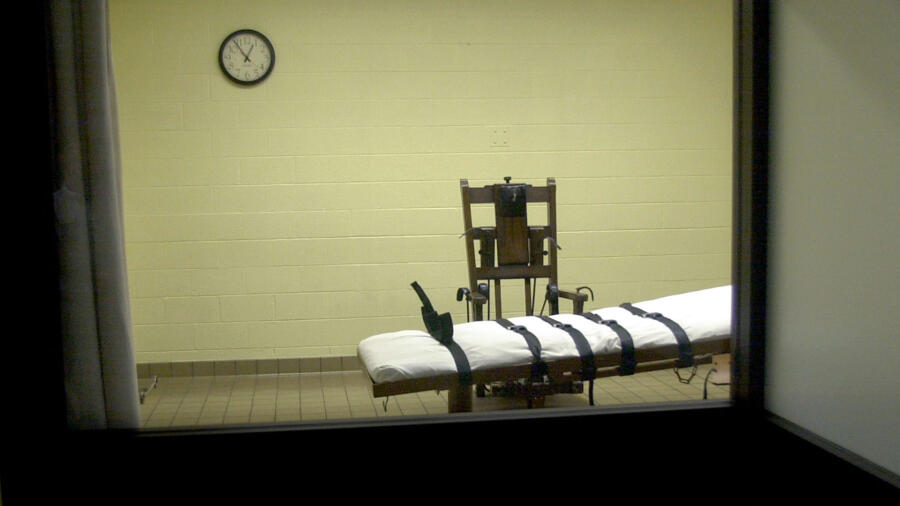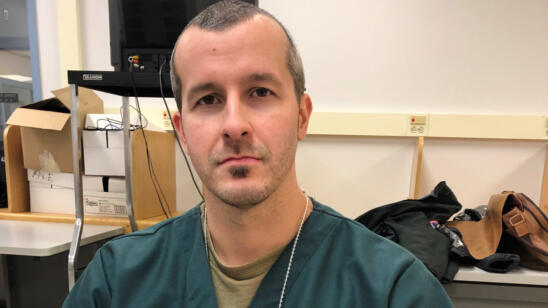When Randy Gardner saw the police sketch of the fugitive killer on television, he knew his younger brother Ronnie was the culprit.
That’s because the face “had a cut on his head,” Randy tells A&E True Crime. “Ronnie and I had had a fight the night before, because he’d slept with my girlfriend. I’d hit him.”
The 1984 murder of bartender Melvyn John Otterstrom during a robbery of Cheers Tavern in Salt Lake City, Utah, was the most gruesome crime yet for Ronnie Lee Gardner, then 23. It did not, however, come out of the blue.
He had been in and out of detention centers and prisons since his early teens: repeatedly escaping and getting recaptured. According to Randy, “Every time he’d escape was the only time we’d see him. To us, it was kind of normal.”
The murder occurred shortly after one such breakout, and after Ronnie’s arrest for that crime he struck yet again, this time in the spring of 1985, while trying to escape from the courthouse during a trial proceeding in the bar-room homicide. Using a smuggled gun, Ronnie shot and killed attorney Michael Burdell and critically wounded a bailiff before being apprehended yet again.
Ronnie was convicted of murder in 1985 and received the death penalty. He was given a choice over the method of his execution: lethal injection or firing squad. He chose firing squad and was executed in 2010.
In the eyes of the law, Ronnie Gardner’s execution marked the end of his case. But for Randy, watching his younger brother be put to death meant the beginning of a new trauma: being a surviving family member to someone who has been executed by the state.
Now 59 years old, Randy says he has recurring dreams about his brother’s fate.
“I’m executing Ronnie, or he’s executing me, or I’m trying to break him out,” he says. “Seven years after the execution, I dream I’m trying to break him out of prison. It’s just a nightmare.”
In his waking moments, Randy finds life difficult in its own way. Now he struggles to concentrate on his business, doing air-conditioner repairs.
“I couldn’t go out and get a regular job,” Randy says. “I’m messed up. I’m broken. They murdered my brother and it’s not right.”
Part of his trauma, Gardner says, is guilt about not shepherding Ronnie to a better life.
“I should’ve been a better big brother,” he says. “But I was a street kid, only one step below him. School was the only thing that saved me.”
Randy says he also feels tormented by his decision not to turn his sibling in. The two met up in the days immediately following Ronnie’s first murder, while he was still at large. Ronnie confessed to the homicide.
“I said, ‘F— Ronnie, you killed this guy with a little boy. Who’s going to take care of this kid?’ ” says Randy.
“In hindsight, I should’ve turned him in,” he says. “I’m kind of responsible. Maybe I should’ve been on death row.”
But when it comes to turning in family members for capital offenses, there are no easy choices: Just ask Bill Babbitt, 75, who in 1980 reported his younger brother Manuel or “Manny”—a Vietnam War veteran—to the Sacramento Police Department after suspecting him in the murder of 78-year-old Leah Schendel. Schendel was brutally beaten and died during a home burglary.
Manny, a diagnosed paranoid schizophrenic, was living with Bill, Bill’s wife Lisa and her three small children. Bill knew something was amiss when Manny, who was unemployed at the time, suddenly had his own spending money.
While searching through Manny’s effects, Bill discovered a Zippo lighter with the letters “L.S.” engraved in it. Connecting the initials to news reports of the murder victim, he brought his findings to the police, who made the arrest.
Manny Babbitt was convicted of the murder and received the death penalty in July 1982. He was executed by lethal injection in 1999.
Bill believes Manny had become dangerously deranged as a result of post-traumatic stress disorder brought on from his experience serving in Vietnam. Not turning his brother in, he felt, would have been reckless.
“I do believe that other lives were in danger, or that his life was danger,” Bill says, adding that, in the hours between discovering Manny’s deeds and informing the police, he also feared for the lives of his wife and her children.
Despite all this, Bill considers his brother a victim as well, a fundamentally good-but-damaged person whose death sentence was stunningly severe given mitigating circumstances.
“He had a good heart, good morals,” Bill says. “When he came home [from the war], he wasn’t the same Manny who left. The system ran Manny under the hammer.”
Bill says his decision to turn his brother in “tore my family asunder… they’d tell me they loved me, but if I wanted to talk about Manny, they’d roll their eyes, look in the other direction. [One] brother told me, ‘you just want people to feel sorry for you.’ I haven’t spoken to him since. My mother, one time, got upset with me because I didn’t visit Manny that often. She said, ‘you put him there.’ ”
That sense of alienation has driven Bill to seek community with those who’ve experienced similar grief. He’s developed a strong friendship with David Kaczynski, who informed on his own brother, the “Unabomber” Ted Kaczynski. He’s also close with Randy Gardner; all three devote time to work with Journey of Hope, a nonprofit that unites families of the condemned with families of murder victims on speaking tours against the death penalty.
Bill Pelke, the organization’s president and co-founder, lost his grandmother Ruth Elizabeth Pelke in 1985 to a robbery-turned-murder at the hands of Paula Cooper, a 15-year-old girl. Cooper was sentenced to death for the act, and when Pelke began publicly arguing for a commutation to that sentence, he became estranged from his father.
“I was just convinced [Ruth Pelke] would’ve had compassion for this girl’s family and this girl,” says Pelke. “[My father] expressed dismay. He was not happy.”
(Cooper was released from prison in June 2013 after a successful appeal. She committed suicide in May 2015.)
“I cleave to people like this,” says Bill Babbitt, speaking of the Journey of Hope community. “These are the people who took the place of my brothers and sisters and my family. These are the people I can go to and talk to about Manny, and they don’t change the subject.”
More Posts You May Be Interested In:
What It’s Like to Be a Prison Chaplain to Death-Row Inmates
What It’s Like to Be a Crime-Scene Investigator
What It’s Like to Train Police Dogs


